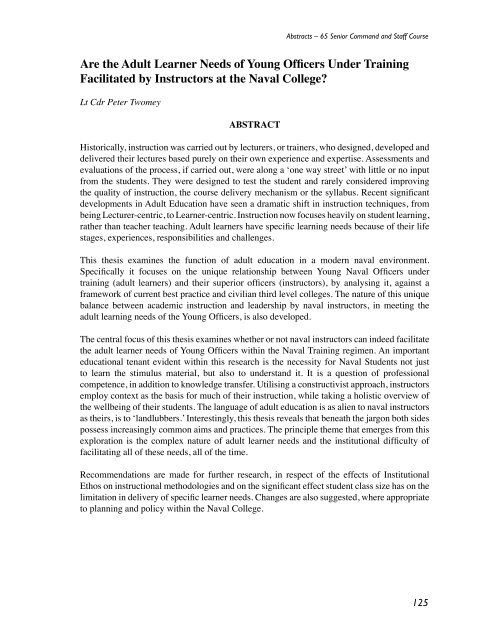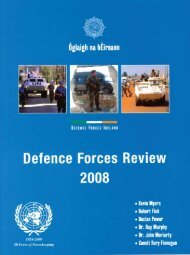Defence Forces Review 2010
Defence Forces Review 2010
Defence Forces Review 2010
You also want an ePaper? Increase the reach of your titles
YUMPU automatically turns print PDFs into web optimized ePapers that Google loves.
Abstracts – 65 Senior Command and Staff CourseAre the Adult Learner Needs of Young Officers Under TrainingFacilitated by Instructors at the Naval College?Lt Cdr Peter TwomeyABSTRACTHistorically, instruction was carried out by lecturers, or trainers, who designed, developed anddelivered their lectures based purely on their own experience and expertise. Assessments andevaluations of the process, if carried out, were along a ‘one way street’ with little or no inputfrom the students. They were designed to test the student and rarely considered improvingthe quality of instruction, the course delivery mechanism or the syllabus. Recent significantdevelopments in Adult Education have seen a dramatic shift in instruction techniques, frombeing Lecturer-centric, to Learner-centric. Instruction now focuses heavily on student learning,rather than teacher teaching. Adult learners have specific learning needs because of their lifestages, experiences, responsibilities and challenges.This thesis examines the function of adult education in a modern naval environment.Specifically it focuses on the unique relationship between Young Naval Officers undertraining (adult learners) and their superior officers (instructors), by analysing it, against aframework of current best practice and civilian third level colleges. The nature of this uniquebalance between academic instruction and leadership by naval instructors, in meeting theadult learning needs of the Young Officers, is also developed.The central focus of this thesis examines whether or not naval instructors can indeed facilitatethe adult learner needs of Young Officers within the Naval Training regimen. An importanteducational tenant evident within this research is the necessity for Naval Students not justto learn the stimulus material, but also to understand it. It is a question of professionalcompetence, in addition to knowledge transfer. Utilising a constructivist approach, instructorsemploy context as the basis for much of their instruction, while taking a holistic overview ofthe wellbeing of their students. The language of adult education is as alien to naval instructorsas theirs, is to ‘landlubbers.’ Interestingly, this thesis reveals that beneath the jargon both sidespossess increasingly common aims and practices. The principle theme that emerges from thisexploration is the complex nature of adult learner needs and the institutional difficulty offacilitating all of these needs, all of the time.Recommendations are made for further research, in respect of the effects of InstitutionalEthos on instructional methodologies and on the significant effect student class size has on thelimitation in delivery of specific learner needs. Changes are also suggested, where appropriateto planning and policy within the Naval College.125
















